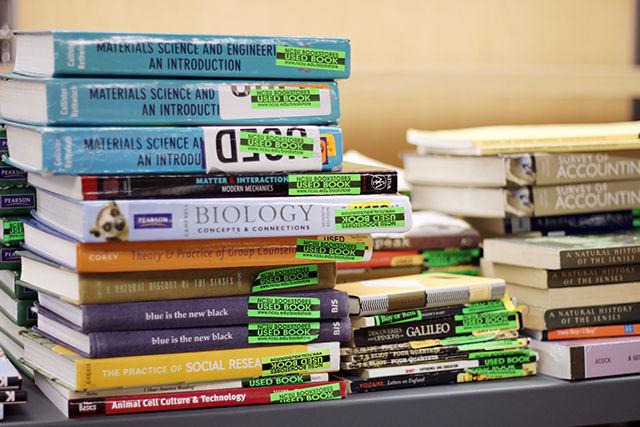College textbook prices have risen 1,041 percent from January 1977 to June 2015, according to NBC’s review of data from the Bureau of Labor Statistics. A team from NC State is working to reduce textbook prices while also allowing instructors to customize their course textbooks.
“I don’t need to tell you that textbooks are expensive, people are struggling to buy them,” said William Cross, director of the NC State Copyright & Digital Scholarship Center. “About 65 percent of students don’t buy the textbook every year, and about 10 percent of students fail.”
Cross and his team have created a program to lower that 10 percent statistic by providing grants to teachers to create free alternate textbooks. The Alt-Textbook program aims to cut textbook costs to students and give teachers a chance to teach off the book.
“We want to do something to empower our faculty to do the cool teaching they want to do,” Cross said. “If you’re going to bring in really smart people from around the country, don’t have the textbook teach the class, have the faculty member teach the class.”
Cross said the program aims to involve students in the creation of new Alt-Textbooks as well. With Alt-Textbooks, the material becomes more catered to the student-teacher relationship as opposed to one-size-fits-all textbooks, according to Cross.
“In the textbook industry, they like to use the phrase that the best textbook is ‘teacher proof,’ meaning you don’t even hear the teacher’s voice at all,” Cross said. “That doesn’t make a whole lot of sense. You want the textbooks to reflect the specific teacher. We don’t want students to just read and regurgitate material.”
Cross said that, while the Alt-Textbook program is specific to NC State, other UNC System universities such as East Carolina University and UNC-Charlotte have begun to adopt similar programs. Cross said he is excited about the possibility of Alt-Textbooks becoming a System-wide program in the future, but doesn’t think that it’s going to happen anytime soon.
“We spent $12,000 and saved students $200,000,” Cross said. “If all of the System schools got together and had similar results, you could really reach incredible savings for students.”
All of the Alt-Textbooks are open resources, meaning that they are freely available for anyone to access. This allows NCSU Libraries and the teachers involved to spread information about the successes and shortcomings of the various different textbook alternatives created. Cross said NCSU Libraries has also been working with the college library community to try to get Alt-Textbook programs not just statewide, but on a national and global level.
“That’s one of the exciting things about open-education sources is that you get people in developing parts of the world that just can’t afford a $200 textbook,” Cross said. “The question we are trying to answer right now is, ‘Do you want to keep making these individual projects that are then federated outward or a more unified effort?’”
Alt-Textbooks began last year with 12 instructors developing open alternatives across eight different departments. This year, the program is working with 11 instructors across nine different departments. One of the biggest successes of the program came in the form of a chemistry lab at NC State that replaced its textbook with a video library known as Student-Made Audiovisuals Reinforcing Techniques, or S.M.A.R.T for short.
The videos were created using Alt-Textbook grant money through a collaboration between Maria Gallardo-Williams, a teaching associate professor in the NC State Department of Chemistry, and her students.
“Each one of the S.M.A.R.T. videos has been scripted by students, acted by students, voiced by students and it represents the best peer-to-peer sharing opportunity that I can possibly offer,” Gallardo-Williams said. “My role is to organize, produce, coordinate, bring people and resources together, but it is the student component that makes this project unique.”
Students involved in the program used social media websites such as Twitter and Facebook to ask their peers what they would want from an educational video. Students requested that the videos be short, to the point and without annoying jokes or cheesy music.
“The responses from students have been very positive,” Gallardo-Williams said. “The fact that the videos are student-made and very short makes them very easy to watch. I can honestly say that the students are in favor of the change. Plus they are saving a lot of money by not having to buy a textbook.”
In addition to working with major departments such as chemistry, Cross said the Alt-Textbooks program also worked with under-served departments and disciplines that were not supported by the textbook market very well.
An example of this is the Department of Parks, Recreation & Tourism Management who, instead of having to deal with the problem of an expensive textbook, deals with the problem of having no textbook available at all.
“We’re very excited about round two of the Alt-Textbook program,” Cross said. “We’re doing everything from electromagnetic engineering, to yoga, to an intro to writing textbook that we hope the community colleges can pick up as well. Everything from very serious, to fun and lighthearted, to something that we hope will reach beyond the limits of college.”
Currently, the Alt-Textbooks are scattered across a variety of different locations such as YouTube, GitHub and teacher-made WordPress sites for students and other schools to locate and view the different educational resources created. NCSU Libraries is currently in the planning stages of creating a centralized website where all Alt-Textbook resources can be easily located.








